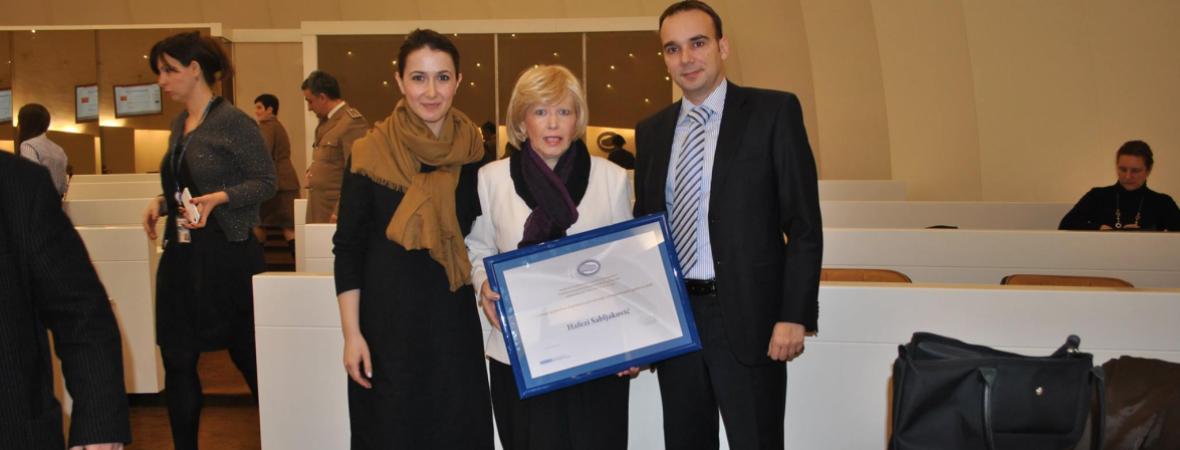Bosnian State Institutions Recognize IRI Program Participant for Her Contribution to Promoting Gender Equality

The success or failure of democracy assistance usually depends on many factors. It is, of course, important to have innovative program ideas, good teams on the ground and sufficient funds, but more than anything else it is the profile of the program beneficiaries that often makes a crucial difference. When you are fortunate enough to come across really committed individuals who are willing to engage fully in the program and give 100 percent at all times, then you are truly able to bring it to another level.
One such individual is Hafeza Sabljakovic, a prominent doctor turned politician from the small city of Cazin in northwest Bosnia. Five years ago she was one of the many women MPs present at the joint Women’s Democracy Network (WDN) and IRI Bosnia Caucus-Building Seminar in Sarajevo. Those of us on the IRI Bosnia program can still remember her attention, active participation in the workshops and above all her closing remarks when she said that a caucus was needed to address women’s political empowerment in Bosnia, and that she personally would start working on creating such a body in Bosnia’s Federation Parliament.
This was not exactly the first time that we have heard such bold and passionate claims from training participants, only to be disappointed later on with the lack of real progress. So, our initial skepticism was understandable, especially having in mind that Bosnia has a complicated political system with sometimes labyrinthine parliamentary procedures. But soon we discovered that our initial pessimism was completely unfounded and that Hafeza was not only serious about her claims but – more importantly – that she was the right person to do it. She relentlessly started to lobby not only her female colleagues but literally everybody else in the parliament while at all times working and consulting with IRI staff on all of the necessary details.
Finally, after overcoming many hurdles in the path of establishing the first cross-party, cross-ethnic and issue-based caucus in Bosnia’s history Hafeza’s vision became reality in early 2013, when the Federation Parliament voted in favor of officially recognizing the Women’s Caucus as a regular parliamentary body.
The initiative to form the first cross-party caucus and promote political cooperation across party lines has received great attention and support from the public, especially women’s organizations and international organizations. Moreover, women leaders, who have long been marginalized by the media, have made positive news headlines and have shifted the focus from nationalist rhetoric and lack of political cooperation in the male-dominated political scene, to common goals of women from political, economic and social spheres.
Immediately upon its formation, Bosnia’s Women’s Caucus, under Hafeza’s leadership and with ongoing IRI support, established links with the newly established women’s caucus in neighboring Serbia with the aim of becoming the driving force behind a regional network of female parliamentarians in the Western Balkans.
One of the first initiatives of the Women’s Caucus was the adoption of a strategic document on promoting women’s entrepreneurship development. The Caucus worked with women entrepreneurs, gender commissions and other relevant stakeholders to develop a set of recommendations and an action plan to encourage women to start their own businesses and achieve economic security and independence. This initiative resulted in the adoption of an amendment to the 2014 budget which provided one million Bosnian Marks to support women agricultural entrepreneurs through the establishment of a revolving fund which would provide incentives to women farmers.
The Caucus also addressed other important issues such as ensuring that unemployed single parents are included in the Government’s “Opportunities for All” effort, a program established to help minority groups get jobs. Single parents had previously not been regarded as a priority group. The Caucus made certain that this vulnerable group would find its place among those who should receive assistance from the government and its institutions. The Caucus also proposed an amendment to the Family Law, later adopted by Parliament, prohibiting spouses to file for divorce during the pregnancy period, as this is a vulnerable period for women. Hafeza personally was instrumental in proposing another set of amendments to the Criminal Code, containing a total of 41 articles, which aims to increase the protection of women and children victims of domestic violence and sexual crimes/harassment.
Having in mind all of this, we didn’t think twice when we decided to nominate Hafeza for the Award for Contribution to Gender Equality in Bosnia and Herzegovina, delivered by the Bosnian Parliament and the National Agency for Gender Equality. In our nomination we noted Hafeza’s tireless commitment to greater representation of women in public office and cooperation between women MPs and civil society. Soon afterward we were delighted to hear that the selection committee accepted our nomination and decided to present the Award to Hafeza.
On February 16, Sabljakovic received the Award in front of a distinguished audience in the White Hall of the State Parliament. In her very emotional address, Sabljakovic spoke about her and IRI’s role in forming the Women’s Caucus and her own current struggle with cancer:
“Today, as I receive the Gender Equality Award, I want to thank both IRI for nominating me and the selection committee for recognizing me with this award. You have made this day the happiest day of my life. My friends at IRI have assisted me and my dear colleagues in the Caucus throughout our struggle to form the Women’s Caucus. Now they have also thought of me and continue to support me during my very own personal struggle. I am deeply honored to receive this award and to be recognized…I will continue to fight for this cause and I believe that women’s caucuses are a crucial step towards reaching true gender equality in BiH.”
Top